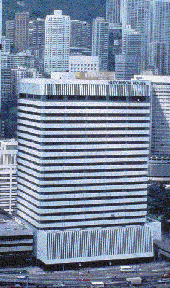CONTACT US
|
ADVERTISING INFO
© 1996-2013 Asian Media Group Inc
No part of the contents of this site may be reproduced without prior written permission.
HONG KONG, TESTOSTERONE &
BIRTH OF THE ASIAN CENTURY
PAGE 3 OF 8
| Westerners may see the sun setting on the fantasy of an endlessly exotic Orient laid at their feet. |
 n testosterone terms, the return of Hong Kong marks the high point
for China since chasing out Chiang Kai-shek's Kuomingdang in 1949. What's
known today as Hong Kong was snatched by Britain in three grabs. First, it
took Hong Kong Island and Harbor "in perpetuity" under the 1842 Treaty of
Nanjing after British gunboats humbled China for trying to stop British opium
shipments. In 1860 the British extorted Kowloon after easily subduing the
Chinese in the second Opium War. Then in 1898 Britain forced a crumbling
Qing Dynasty to grant a 99-year lease on the area around Kowloon Peninsula
known as the New Territories which now comprises 98% of Hong Kong's land
area. Technically the June 30, 1997 lease expiration didn't require Britain to
hand back Hong Kong Island which contains the colony's business center.
However, after years of saber-rattling and negotiations Deng Xiaoping
convinced Margaret Thatcher in 1984 that all of Hong Kong must revert to
Chinese sovereignty. In exchange, China promised to preserve Hong Kong's
unique social and economic system for 50 years.
n testosterone terms, the return of Hong Kong marks the high point
for China since chasing out Chiang Kai-shek's Kuomingdang in 1949. What's
known today as Hong Kong was snatched by Britain in three grabs. First, it
took Hong Kong Island and Harbor "in perpetuity" under the 1842 Treaty of
Nanjing after British gunboats humbled China for trying to stop British opium
shipments. In 1860 the British extorted Kowloon after easily subduing the
Chinese in the second Opium War. Then in 1898 Britain forced a crumbling
Qing Dynasty to grant a 99-year lease on the area around Kowloon Peninsula
known as the New Territories which now comprises 98% of Hong Kong's land
area. Technically the June 30, 1997 lease expiration didn't require Britain to
hand back Hong Kong Island which contains the colony's business center.
However, after years of saber-rattling and negotiations Deng Xiaoping
convinced Margaret Thatcher in 1984 that all of Hong Kong must revert to
Chinese sovereignty. In exchange, China promised to preserve Hong Kong's
unique social and economic system for 50 years.
To what extent that last promise will be carried out from July 1 forward has provided the west with an excuse for commencing the first of the ballsgames that will mark the transition from the American to the Asian Century. As we joined the breathless global fixation on Hong Kong's last days as a British colony, some of us wondered whether the city is worth all that attention. No matter how energetic and rich, a commercial center of 6.4 million is hardly a global power, even if it does now boast the world's highest per capita GDP, having recently matched the U.S.'s $25,000.
Hong Kong's power to fascinate, perhaps its real significance, lies in its role as a global Roscharch test for this transitional age. Everyone projects its hopes and fears into Hong Kong. Chinese see the loss and restoration of national honor and the hope of capitalist prosperity to come. Asians in general--including Asian Americans, despite the protestations of some--welcome it as a clear sign of the rise of Asian power and prestige relative to the west's--tinged, perhaps, with anxiety at the prospect of living in the shadow of a newly emerging Asian superpower. Westerners may see the sun setting on the fantasy of an endlessly exotic Orient laid at their feet--the figurative loss of all the Susie Wongs in all the seedy bars--and perhaps, an erasing of one of the last remaining markers of a century of shameless racial exploitation. Manhood--its diminution and restoration--looms large in the mix of emotions on all sides. It's this hormonal response to the drama of Hong Kong's return to China--the homecoming of the waif-turned-glittering-concubine--that injects a high dose of testosterone into the posturing and discussions that have come--and will come for years--on the fate of Hong Kong.

Once the symbol of British Commercial power, Hutchison House is now controlled by Chinese Hong Kong tycoon Li Kashing.
Beneath the volatile emotional mix lie some hard realities. Hong Kong
provides a somewhat anxious world the first real proving ground for the
intentions and capabilities of the post-Deng generation of Beijing bosses. If
they benignly let Hong Kong's success and prosperity expand radially out into
China itself--as they have shown some desire to do--the handover would
mark the start of a genuine Asian Century or even an Asian Millennium. If
China's leaders let testosterone poison this worthy objective and find
themselves forced either to cannibalize or strangle Hong Kong, the Asian
Century would be delayed--and China's own future as a prosperous, united
nation would be in doubt. If push comes to shove, in the long run Hong
Kong's brand of hypercapitalism is likely to prove a more compelling dream
for China's masses than that of preserving the earth's oldest and biggest
nation.
PAGE 4
| PAGE 1 | 2 | 3 | 4 | 5 | 6 | 7 | 8 |
